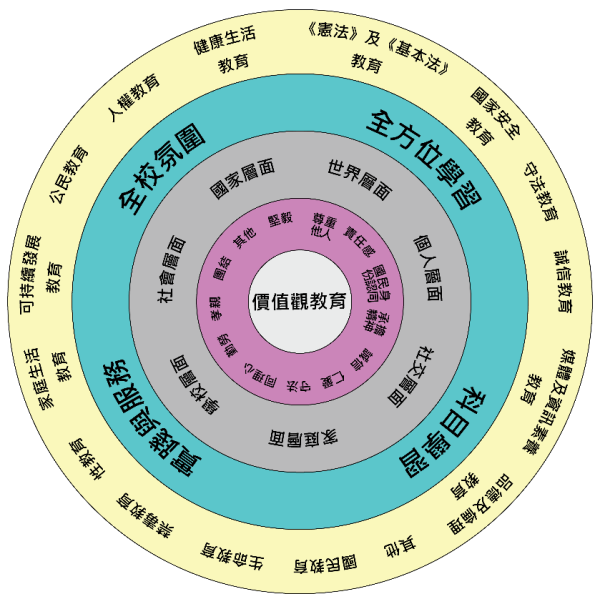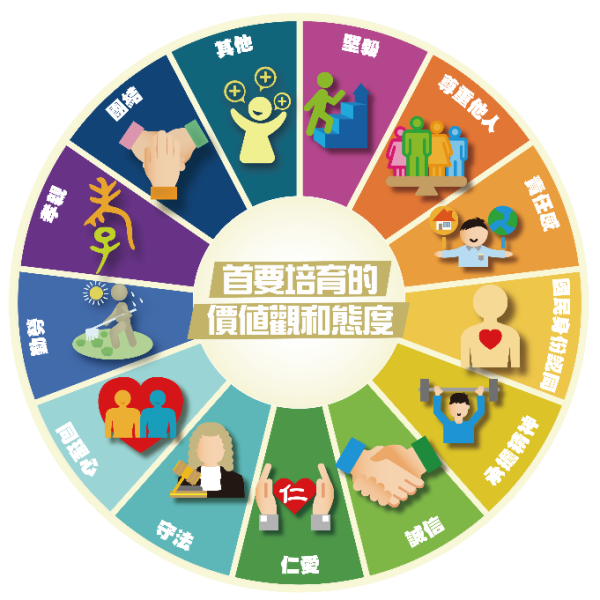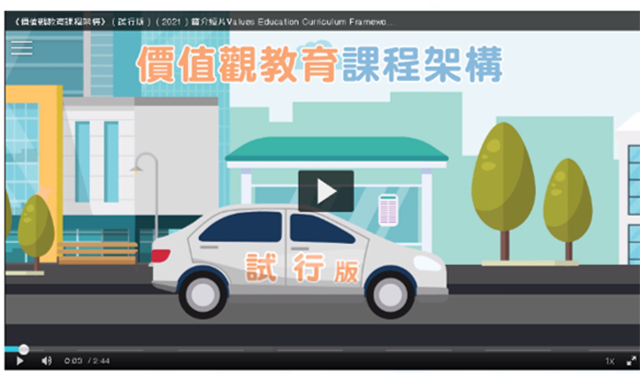Values Education
Suggested learning time: approximately 1 hour
Values education is an essential component of all-round education and an integral part of the school curriculum. In the curriculum guides of kindergarten, primary and secondary education, values education is stipulated as one of the learning goals. The implementation of values education in schools should not be limited to specific lessons. Instead, it should adopt a broader approach that helps students understand proper values, cultivate a positive attitude towards life and practice appropriate behavior through different learning activities within and beyond the classroom, service-learning experiences and the creation of a positive campus atmosphere.
Integration of Cognition, Affection and Action
Values education is a comprehensive, interactive, authentic, reflective and practical learning experience. It integrates the learning content of various cross-curricular domains in values education through learning activities inside and outside the classroom to help students (i) deepen their understanding of proper values and Chinese virtues (cognition); (ii) enhance their recognition of relevant proper values, cultivate empathy and develop a positive attitude towards life and affection for the country and Hong Kong (emotion); (iii) practice appropriate and good behavior (practice), enabling them to identify and adhere to proper values in different life situations (including in the face of dilemmas and various changes and challenges) for the common well-being of the country and its people, as well as the overall betterment of society. Students are encouraged to use proper values as the basis for their judgment, decision-making, and actions, thereby practising appropriate and responsible behaviour.
Implementation Strategies
Taking cultivation of proper values and attitudes as the direction, schools should make use of everyday life events to amalgamate the learning content and activities of various cross-curricular domains in values education, including moral education, civic education, national education (including Constitution, Basic Law, patriotic education and national security education), anti-drug education, life education, sex education, media and information literacy education, education for sustainable development, human rights education under the legal framework, etc., by adopting the approaches of “organic integration”, “natural connection”, “diversified strategies”, “mutual coordination”, “learning within and beyond the classroom”, and “whole-school participation”. This is to provide students with all-round learning experience and strengthen the connection among the various cross-curricular domains in values education, which in turn facilitates students’ whole-person development.

(Chinese version only)
Priority Values and Attitudes
Schools could promote values education through nurturing in their students the twelve priority values and attitudes (PVAs): “Perseverance”, “Respect for Others”, “Responsibility”, “National Identity”, “Commitment”, “Integrity”, “Benevolence”, “Law-abidingness”, “Empathy”, “Diligence”, “Filial Piety” and “Unity” , as the direction for promoting values education. Under the principle of school-based management and in accordance with the Values Education Curriculum Framework (Pilot Version) as well as their school vision and mission, uniqueness, religious background, school context, student needs and societal expectations, etc., schools should amalgamate their school-based advocated values and attitudes with the PVAs with a view to planning and enriching their values education curriculum in different grade levels holistically. Schools should also integrate Chinese culture in the learning context and content of different cross-curricular domains in values education. This is to provide students with comprehensive, interactive and real-life learning activities that emphasise reflection and practice, so as to deepen students’ understanding and recognition of the PVAs and their practice and promotion of the PVAs in daily life.

(Chinese version only)
In addition to the PVAs, each subject also encompasses proper values and positive attitudes towards life. Schools should integrate elements of values education as appropriate when teaching relevant topics in each subject, taking into account its uniqueness and curriculum content. Various teaching strategies, such as questioning, group discussions, and drama should be adopted. This is to help students better understand the values embedded in different life situations and facilitate their reflection.
Video 1
Enhancement of Values Education – Cultivate students’ good moral character
(Chinese Version Only)
[Video length: about 2 minutes]
Video 2
Values Education Curriculum Framework (Pilot Version) (2021)
(Chinese Version Only)
[Video length: about 3 minutes]
Suggested Follow-up Activities
Please read “Values Education Curriculum Framework (Pilot Version)” (2021). [89 pages] CHI
Additional Reference Materials
Other EDB documents relating to values education (including curriculum documents, circulars, webpage, etc.):
- Full Text of “The Constitution of the People's Republic of China”
- Full Text of “The Basic Law”
- Full Text of “The Law of the People's Republic of China on Safeguarding National Security in the Hong Kong Special Administrative Region”
- “National Flag and National Emblem Ordinance”
- “National Anthem Ordinance”
- “Regional Flag and Regional Emblem Ordinance”
- Secondary Education Curriculum Guide (2017) - Booklet 6A: Moral and Civic Education: Towards Values Education
- Supplementary Notes to the Secondary Education Curriculum Guide (2017) (Published in June 2021)
- Primary Education Curriculum Guide (2024)
- Curriculum Framework of National Security Education in Hong Kong (2025) (Chinese version)
- Education Bureau Circular No. 9/2023 - National Security: Maintaining a Safe Learning Environment Nurturing Good Citizens
- Education Bureau Circular No. 4/2021 - National Security Education in School Curriculum - Curriculum Documents
- Education Bureau Circular No. 6/2021 - National Security Education in School Curriculum - Additional Curriculum Documents and Learning and Teaching Resources
- Education Bureau Circular No. 2/2021 - National Security Education in School Curriculum - Implementation Mode and Learning and Teaching Resources
- National Education One-stop Portal


